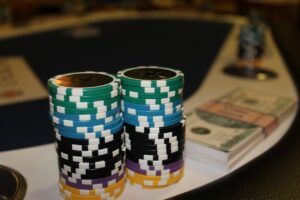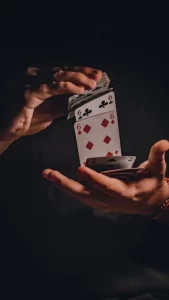Introduction:
Leveraging Psychological Tactics for a Winning Edge in Poker
In the highly competitive world of poker, where skill and strategy play crucial roles, mastering the psychological aspect of the game can provide players with a significant advantage. Understanding and effectively utilizing psychological tactics can tilt the odds in one’s favor, enabling them to outwit opponents and secure victory. This article explores how leveraging psychological tactics can give players a winning edge in the complex and thrilling game of poker.
The Power of Observation: How to Read Your Opponents in Poker
Poker is a game of strategy, skill, and deception. While mastering the rules and understanding the odds are crucial components to success, one often overlooked aspect of the game is the power of observation. Being able to read your opponents can give you a significant advantage, allowing you to make more informed decisions and ultimately come out on top.
In the world of poker, players wear their emotions on their sleeves. Their facial expressions, body language, and even their betting patterns can reveal valuable information about the strength of their hand or their overall strategy. This is where the power of observation comes into play.
When sitting at a poker table, it’s essential to pay close attention to your opponents. Look for any signs of nervousness, such as fidgeting or sweating, which could indicate that they have a weak hand. Conversely, if someone appears overly confident or relaxed, it may suggest that they are holding a strong hand and are ready to pounce.
Another valuable clue lies in your opponents’ eye movements. Research has shown that when people are trying to recall something visually, their eyes tend to move in specific patterns. By observing these eye movements, you can gain insight into whether your opponent is recalling a memory (indicating a bluff) or creating a visual image (suggesting a strong hand).
Furthermore, watch how your opponents handle their chips. Are they grabbing them tightly, indicating anxiety? Or are they casually tossing them into the pot, suggesting confidence? These small gestures can provide critical clues about the mental state and overall strategy of your opponents.
However, it’s important to note that not all tells are created equal. Some players are skilled at masking their emotions and maintaining a neutral demeanor throughout the game. In these cases, it becomes necessary to look for more subtle cues, such as microexpressions – fleeting facial expressions that reveal true emotions. These split-second reactions can be challenging to spot but can offer invaluable insights into your opponents’ mindset.
In addition to observing individual players, it’s also crucial to pay attention to the dynamics at the table. Are certain players consistently raising or folding? Do they tend to bet aggressively or play more conservatively? By recognizing these patterns, you can adapt your strategy accordingly and exploit any weaknesses in their gameplay.
To leverage the power of observation effectively, it’s essential to remain focused and avoid distractions. The ability to concentrate for extended periods is a skill that can be honed through practice and discipline. By eliminating external distractions and maintaining a clear mind, you can sharpen your observational skills and become a formidable force at the poker table.
In conclusion, mastering the art of observation is a powerful tool in poker. By paying close attention to your opponents’ behavior, body language, and betting patterns, you can gain valuable insights into their hand strength and overall strategy. This information allows you to make better-informed decisions and gives you a significant advantage over your opponents. However, it’s important to remember that observation alone is not enough – it must be combined with sound strategy and a deep understanding of the game. With practice and perseverance, you can harness the power of observation and take your poker game to new heights.
Mastering the Art of Bluffing: Psychological Tactics in Poker
Poker is a game of strategy, skill, and deception. While mastering the rules and understanding the odds are essential components to becoming a successful player, there is another aspect that separates the amateurs from the pros: psychological tactics. In this section, we will delve into the art of bluffing and explore how players can leverage psychological strategies to gain a winning edge in poker.
Bluffing is perhaps the most iconic tactic in poker. It involves convincing your opponents that you have a stronger hand than you actually do, forcing them to fold and allowing you to claim the pot without having to reveal your cards. The key to effective bluffing lies in creating an illusion of confidence and strength. This can be achieved through various means, such as maintaining a steady gaze, controlling body language, and timing your bets strategically.
One psychological tactic commonly used in bluffing is known as “the stare down.” By locking eyes with your opponent during crucial moments, you can intimidate them and make them doubt their own hand. The power of eye contact should not be underestimated, as it can convey a sense of conviction and authority. However, it is important to use this tactic sparingly, as overdoing it may come across as aggressive or insincere.
Another psychological tactic in bluffing is controlling your body language. When bluffing, it is crucial to maintain a calm and composed demeanor, regardless of the strength of your hand. Avoid fidgeting, excessive sweating, or any other signs of nervousness that might give away your true intentions. Instead, exude confidence through relaxed posture, steady breathing, and deliberate movements. These subtle cues can subconsciously influence your opponents’ perception of your hand.
Timing is everything in poker, and knowing when to execute a bluff is a vital skill. Experienced players understand that the success of a bluff often depends on the context of the game and the behavior of their opponents. For instance, if you notice that your opponents are playing conservatively and folding easily, it may be an opportune moment to bluff. Conversely, if the table is filled with aggressive players who rarely fold, bluffing may not be as effective.
In addition to these tactics, understanding the psychology behind your opponents’ actions can give you a significant advantage. Pay close attention to their betting patterns, facial expressions, and body language. Look for any signs of discomfort or hesitation that might indicate a weak hand. By observing and analyzing these cues, you can make more informed decisions and adjust your own strategies accordingly.
However, it is important to remember that psychological tactics should be used judiciously and ethically. Poker is ultimately a game of skill and strategy, and relying solely on manipulation and mind games will only get you so far. The best players combine psychological tactics with a solid understanding of the game’s fundamentals, such as odds calculation and position play.
In conclusion, mastering the art of bluffing requires a deep understanding of human psychology and the ability to manipulate perception. By employing tactics such as maintaining eye contact, controlling body language, and timing your bets strategically, you can increase your chances of success in poker. However, it is crucial to use these tactics responsibly and in conjunction with a strong foundation of poker skills. After all, true mastery of the game lies in finding the delicate balance between deception and strategy.
Understanding Body Language: Using Nonverbal Cues to Gain an Edge in Poker
Poker is a game that has captivated players for centuries. It combines strategy, skill, and a bit of luck to create an exhilarating experience. While many focus on the cards they are dealt or the bets they place, there is another crucial element that can give players a winning edge – understanding body language.
In poker, nonverbal cues play a significant role in determining the strength of your opponents’ hands. By observing their body language, you can gain valuable insights into their thoughts and intentions, allowing you to make more informed decisions at the table.
One of the most important aspects of body language in poker is eye contact. The eyes are often referred to as the windows to the soul, and in this case, they can reveal much about a player’s confidence or nervousness. When someone avoids making eye contact, it could indicate that they have a weak hand and are trying to hide their emotions. On the other hand, strong eye contact may suggest that a player is bluffing, attempting to intimidate others with their unwavering gaze.
Another key nonverbal cue to pay attention to is facial expressions. Microexpressions, which are fleeting facial expressions that last only a fraction of a second, can provide critical information about a player’s emotional state. A quick twitch of the mouth or a raised eyebrow might betray excitement or disappointment, giving you a clue about the quality of their hand. However, it’s essential to remember that some players are skilled at controlling their facial expressions, so it’s not always a foolproof method.
Gestures and body movements also offer valuable insights in a poker game. For example, if a player suddenly becomes tense or fidgety, it could indicate that they are under pressure and unsure about their hand. Conversely, relaxed and confident body language might suggest that they have a strong hand and are feeling secure in their decision-making. Additionally, the way players handle their chips can reveal their level of comfort or discomfort. Nervous shuffling or stacking of chips might indicate a weaker hand, while calm and deliberate movements can signal confidence.
Posture is another nonverbal cue that can provide valuable information in poker. A slouched or closed-off posture might suggest a lack of confidence or a weak hand. On the other hand, an open and upright posture can indicate self-assuredness and strength. By observing how players carry themselves at the table, you can gain insights into their mindset and potentially exploit any weaknesses.
Transitional phrase: In conclusion, understanding body language and nonverbal cues in poker can give players a significant advantage at the table. By paying attention to eye contact, facial expressions, gestures, and posture, you can gather valuable information about your opponents’ thoughts and intentions. However, it’s important to remember that body language is not foolproof and should be used in conjunction with other strategies and skills.
So, next time you sit down for a game of poker, take a moment to observe your opponents closely. Pay attention to their eyes, their facial expressions, and their body movements. These subtle cues can help you make more informed decisions and increase your chances of coming out on top. After all, in the game of poker, every bit of information counts, and leveraging psychological tactics through understanding body language could be the winning edge you’ve been looking for.
Psychological Warfare at the Poker Table: Manipulating Your Opponents’ Emotions
Poker is not just a game of cards; it’s a battle of wits, where players strategize to outsmart their opponents. While mastering the rules and probabilities is essential, understanding the psychological aspects of the game can give you a winning edge. In this article, we will delve into the world of psychological warfare at the poker table and explore how you can manipulate your opponents’ emotions to your advantage.
One of the most powerful psychological tactics in poker is bluffing. Bluffing involves making your opponents believe that you have a better hand than you actually do. By carefully controlling your facial expressions, body language, and tone of voice, you can create an illusion of strength or weakness, enticing your opponents to make decisions based on false assumptions. However, effective bluffing requires a deep understanding of your opponents’ personalities and playing styles. Observing their reactions and patterns can help you identify their vulnerabilities and exploit them with well-timed bluffs.
Another tactic is known as “tells.” Tells are unconscious actions or behaviors that reveal information about a player’s hand. It could be something as subtle as a twitch, a change in breathing pattern, or even a slight hesitation before placing a bet. By keenly observing your opponents for these tells, you can gain valuable insights into their thought processes and use that knowledge to your advantage. However, it’s important to remember that tells are not foolproof indicators, and experienced players may intentionally fake them to mislead their opponents.
Understanding human psychology also allows you to manipulate your opponents’ emotions during the game. Emotions such as fear, anger, and frustration can cloud judgment and lead to poor decision-making. You can leverage these emotions by employing various techniques. For instance, if you want to induce fear in your opponents, you can adopt an aggressive playing style, consistently raising bets and putting pressure on them. This can force them into making rash decisions out of fear of losing more money. On the other hand, if you want to provoke anger or frustration, you can use slow-playing tactics, deliberately taking your time before making a move. This can frustrate your opponents and make them more prone to making impulsive mistakes.
However, it’s important to note that psychological warfare is a double-edged sword. Just as you can manipulate your opponents’ emotions, they can do the same to you. Thus, maintaining a calm and composed demeanor is crucial. Emotionally intelligent players are able to recognize when their own emotions are getting in the way of rational decision-making and take steps to regain control. By staying focused and detached from the outcome of each hand, you can prevent yourself from falling into traps set by your opponents.
In conclusion, poker is not just about the cards; it’s about understanding the psychology behind the game. By mastering psychological tactics such as bluffing, reading tells, and manipulating emotions, you can gain a winning edge at the poker table. However, it’s essential to remember that these tactics require skill, practice, and careful observation of your opponents. So next time you sit down at the poker table, remember that the battle is not just against the cards but also against the minds of your opponents.
Mind Games and Mental Toughness: Developing a Winning Mindset in Poker
Poker is a game of skill, strategy, and psychological warfare. While many players focus solely on mastering the technical aspects of the game, those who truly excel understand the importance of developing a winning mindset. In this section, we will explore the mind games and mental toughness required to gain a winning edge in poker.
One crucial aspect of poker is understanding your opponents. By observing their behavior, body language, and betting patterns, you can gain valuable insights into their thought processes and intentions. This psychological advantage allows you to make more informed decisions and exploit weaknesses in their gameplay.
A key tactic used by successful poker players is known as “reading” their opponents. This involves paying close attention to subtle cues that reveal information about their hand strength or level of confidence. For example, a player who avoids eye contact may be bluffing, while someone who hesitates before making a bet may have a strong hand. By picking up on these signals, you can adjust your own strategy accordingly and maximize your chances of success.
In addition to reading opponents, maintaining a strong mental state is crucial in poker. The ability to stay calm under pressure and make rational decisions is what separates winners from losers. One technique that many professionals employ is visualization. By mentally rehearsing different scenarios and envisioning themselves making the right moves, players can build confidence and improve their decision-making abilities.
Another important aspect of mental toughness in poker is managing emotions. It’s natural to experience highs and lows during a game, but allowing emotions to cloud your judgment can lead to costly mistakes. Successful players understand the need to detach emotionally from the outcome of each hand and focus instead on making the best possible decision based on available information.
To develop mental resilience, it’s essential to practice self-control and discipline. This means sticking to a predetermined bankroll management plan and avoiding tilt – a state of frustration or anger that often leads to reckless play. By setting limits and maintaining a disciplined approach, players can minimize losses and increase their chances of long-term success.
Furthermore, the ability to adapt to changing circumstances is vital in poker. Just as in life, no two games are ever the same. Being able to quickly assess the dynamics at the table and adjust your strategy accordingly is a skill that separates good players from great ones. This flexibility allows you to exploit weaknesses in opponents’ gameplay and capitalize on favorable situations.
Lastly, it’s worth mentioning the importance of self-awareness in poker. Understanding your own strengths and weaknesses is crucial for continual improvement. By analyzing your gameplay and identifying areas for growth, you can work on honing your skills and becoming a more formidable opponent.
In conclusion, developing a winning mindset in poker requires mastering the art of psychological warfare. By reading opponents, maintaining mental toughness, managing emotions, practicing self-control, adapting to changing circumstances, and cultivating self-awareness, players can gain a significant edge over their competition. While technical skills are undoubtedly important, it is the psychological tactics employed by successful players that truly set them apart. So, if you want to excel in poker, remember that the mind games are just as important as the cards you hold in your hand.In conclusion, leveraging psychological tactics can provide players with a winning edge in poker. By understanding and utilizing strategies such as bluffing, reading opponents’ body language, and managing emotions effectively, players can manipulate their opponents’ decisions and gain an advantage at the table. However, it is important to note that ethical considerations should be taken into account when employing these tactics, as excessive manipulation or deception can undermine the integrity of the game.




